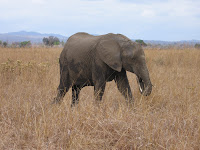Lindsey and Jessica had tipped us off that there was a
Maasai Market taking place just outside
Morogoro. The market was on Saturday near
Dumila, about an hour ride by
Daladala.

That morning Julia, Carla, Katie and I arrived at the
Daladala station at 0830. We were nearly the first ones to board. Like I mentioned earlier, the bus won't leave until its full. We waited and waited. One guy was collecting fares and told us it was 3,500
Tsh each. So we paid. Later we found out that it was actually only 3,000
Tsh. Carla gave him a hard time and made sure he knew that we knew we paid too much. The four of us sat at the back and waited.
1000. Still waiting. People coming up to the windows selling ties,
handkerchiefs, water, oranges and what not. We all just wanted to go.
1100. Bus is half full. We start talking about getting off the bus and trying to go again in two weeks. We agree that at 1300 we would walk off the bus.
1230. Bus is full and we think we're OK to go. One passenger keeps walking to the back and squeezes himself between the four of us to find a seat. Let's go already!
1245 and we're off! Any longer and we would have hopped off.
So we sat squeezed in the back seat, tired and hot. Carla made friends with a gentleman
in front of her who knew some English. They chatted about politics, religion, I think almost everything. He helped us find our stop and the
Maasai Market.
After thanking the man for his help, we saw what we came for. There was a market set up across from the bus stop where
Maasai were trading cattle and selling material and
jewelry. The
Maasai still wear their traditional garments and stretched earlobes, but we found many with b
all caps and cell phones. A sign of changing times. We walked around the market and as the only white people there, we were greeted and offered items to purchase without hesitation.

Near the back of the market we found butchered meat, hanging from trees. From what we saw mostly cow, goat and pig. Further up from the meat were tiny huts that covered log burning fires. The meat was skewered and then placed vertically in the ground next to the fire allowing it to cook.
We found a vacant hut with a table and chairs and as it was getting hot in the afternoon, we sat down with some cold drinks, salted skewered meat and bananas. It was all delicious. We didn't move until it was time to find a ride home.

We made our way to the road to catch another
Daladala back to town. As soon as we asked, "Which one goes to
Morogoro?", Julia's arm was grabbed by four men pulling her in four opposite directions, each to their bus. Talk about supply and demand.

The four of us had to hurry and find the cheapest ride back. We ended up paying 10,000
Tsh for the four of us and squeezing into the last space on one of the buses. Funny to say the least.
On the ride back we had a flat tire.
Yeehaa! So we all got off the bus and waited for the spare to be installed. Along the road, a few
Maasai children were watching. Katie and I made our way closer to the children and they slowly backed away. I pulled out my camera and they seemed startled. I managed to take a quick picture and was able to show it to them. They loved seeing themselves. I asked for another picture and Katie was able to get a shot with the kids.

We made it back home, excited from what we had just experienced.



 The school is still under construction, but there are four walls and a roof, and the locals are excited to start participating. They are so excited that we started programming sooner than expected. Our first classes started 3 weeks ago and we have been returning every week. We are now up to 2 days per week. The classes include basic computer skills, english lessons, HIV/AIDS information, condom demonstrations, gender issues and much more. So far the turnout has been overwhelming and the ratio of female to male participants better than expected.
The school is still under construction, but there are four walls and a roof, and the locals are excited to start participating. They are so excited that we started programming sooner than expected. Our first classes started 3 weeks ago and we have been returning every week. We are now up to 2 days per week. The classes include basic computer skills, english lessons, HIV/AIDS information, condom demonstrations, gender issues and much more. So far the turnout has been overwhelming and the ratio of female to male participants better than expected.

































